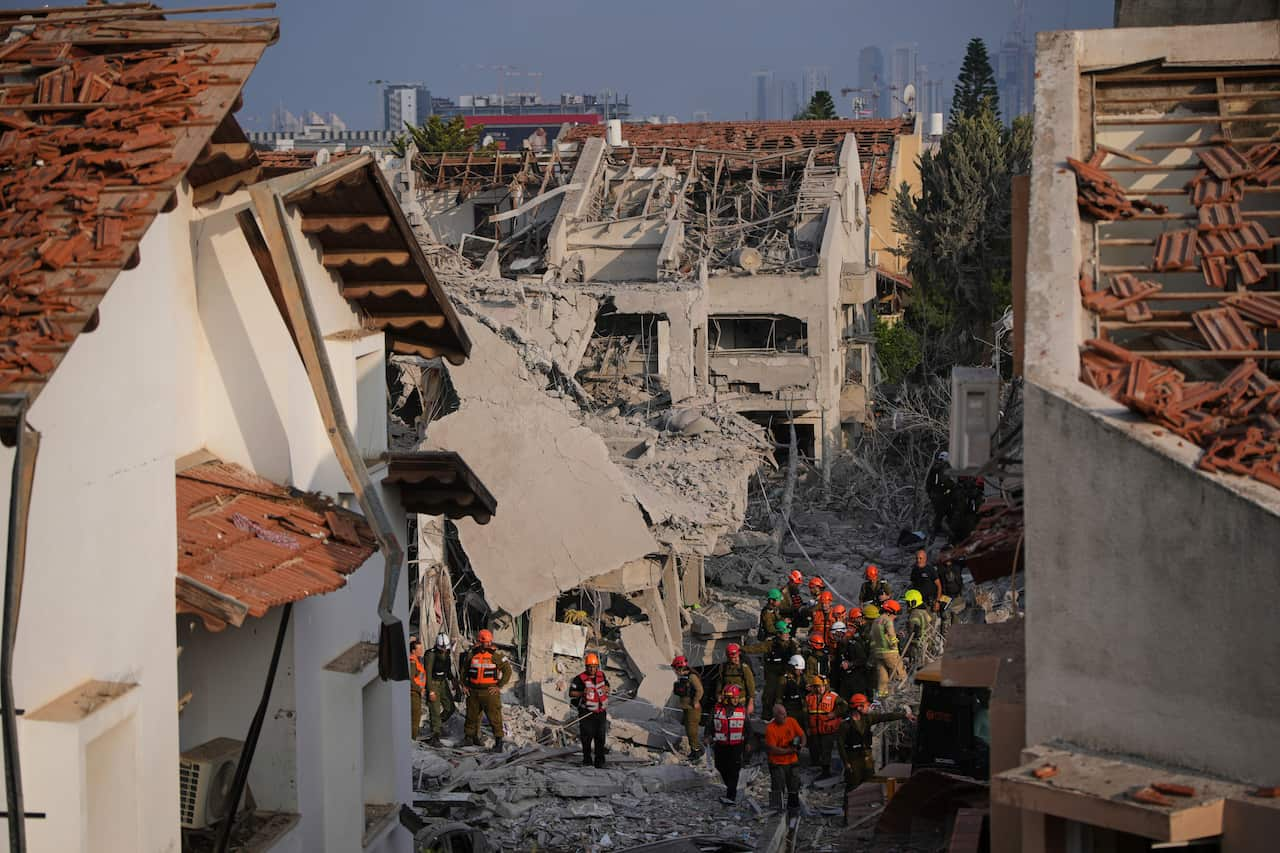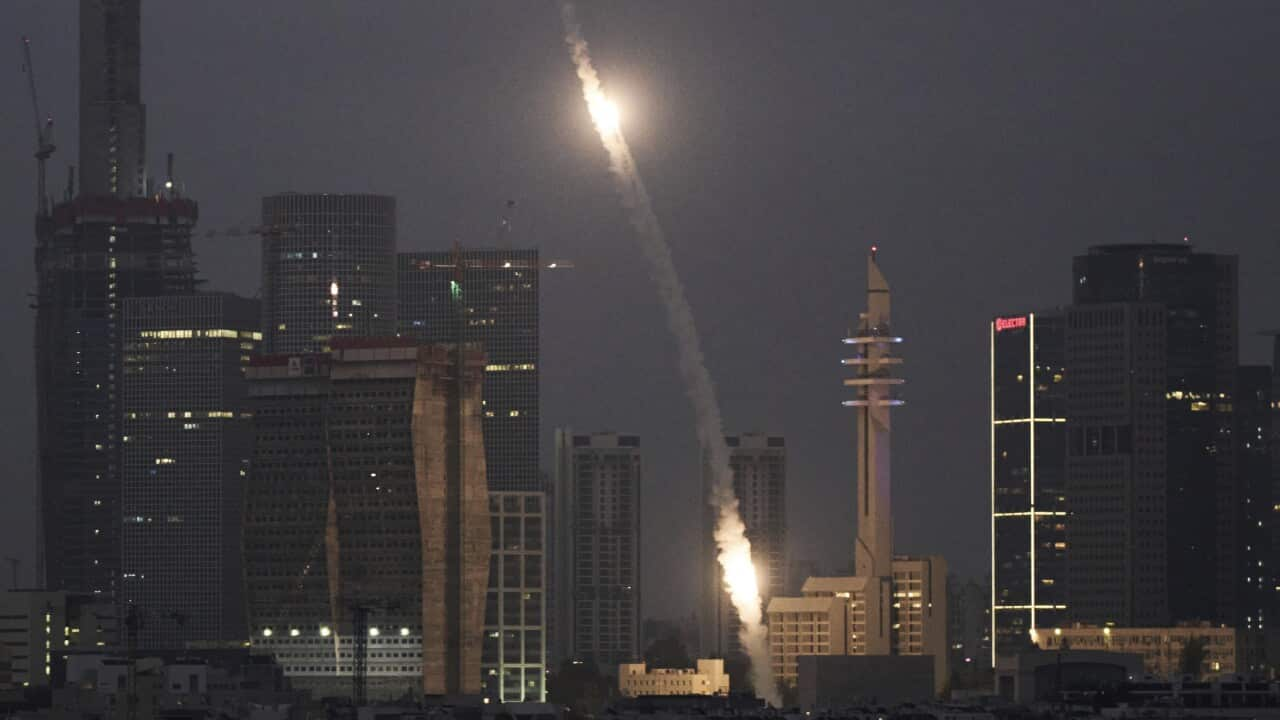Key Points
- Iran and Israel have continued to trade strikes following the latter's attack on Israel on Friday.
- Iran's state TV says around 60 people, including 20 children, were killed in an Israeli attack on a housing complex.
- Two people were killed in Israel by Iranian strikes on Saturday.
Iran and Israel traded missiles and airstrikes on Saturday, the day after Israel launched a sweeping air offensive that Iran said hit its nuclear facilities and killed top commanders along with dozens of civilians.
In Iran's capital Tehran, state TV reported that around 60 people, including 20 children, had been killed in an attack on a housing complex, with more strikes reported across the country as Israel said it had attacked more than 150 targets.
In Israel, air raid sirens sent residents into shelters as waves of missiles streaked across the sky, killing at least three people.
An Israeli official said Iran had fired around 200 ballistic missiles in four waves, and that many had been intercepted.

Israeli defence minister Israel Katz said Iran's leadership had crossed a red line by bringing harm to Israeli civilians.
"If [Supreme Leader Ayatollah Ali] Khamenei continues to fire missiles at the Israeli home front, Tehran will burn," he said in a statement on Saturday.
The Israeli military said it had Tehran in its sights on Saturday after strikes on dozens of missile launchers and air defences in the area around the Iranian capital.
In Iran, explosions were heard overnight across the capital.
Fars News agency said two projectiles had hit Mehraband airport, located inside the capital, which is both civilian and military.
Iran's airspace was closed until further notice, state media reported.
Fears of wider escalation
Iran had vowed to avenge Friday's attack by Israel, which gutted Iran's nuclear and military leadership and damaged atomic plants and military bases, killing 78 people and wounding 320, including civilians, according to Iran's United Nations envoy.
Israel launched its surprise attack on Iran early on Friday, only days before Iran and the United States had been due to hold a sixth round of talks on Iran's nuclear program.
The operation — dubbed "Rising Lion" — has killed Iran's highest-ranking military officer, Mohammad Bagheri, and the head of the Revolutionary Guards, Hossein Salami, among other senior generals.
The unprecedented Israeli strikes on Iran and the subsequent Iranian retaliation raised concerns about a broader regional conflagration, although Iran's allies Hamas in Gaza and Hezbollah in Lebanon have been decimated by Israel.
Khamenei has accused Israel of having initiated a war.
Iran's state media reported on Saturday that Iran had warned the United States, United Kingdom and France that their bases and ships in the region will be targeted if they help stop its strikes on Israel.
Israel's operation "will continue for as many days as it takes to remove this threat," Israeli Prime Minister Benjamin Netanyahu said in a TV address following the initial strikes.
Netanyahu, who for decades has raised the alarm about Iran's nuclear program, said he authorised the air assault in an effort to prevent Iran from building nuclear weapons.
Israel and its Western allies have said this is Tehran's objective, but Iran has denied it.
In a video issued by his office, Netanyahu appealed to the Iranian people to stand up against their leaders. "I am with you, the Israeli people are with you," he said.
"Generations from now, history will record our generation stood its ground, acted in time and secured our common future."
Iran has long insisted its nuclear program is for civilian purposes only.
The UN nuclear watchdog concluded this week that it was in violation of its obligations under the global non-proliferation treaty.
How have world leaders reacted?
US officials said they were helping Israel defend against the missile attacks, even as Washington insisted it had nothing to do with Israel's strikes on Iran.
US President Donald Trump has lauded Israel's strikes and warned of much worse to come unless Iran quickly accepts the sharp downgrading of its nuclear program that the US has demanded in talks that had been due to resume on Sunday
Trump agreed on a call with UK Prime Minister Keir Starmer that "dialogue and diplomacy" were needed to calm the crisis, Starmer's office said.
Trump also spoke with Netanyahu on Friday, US officials said, without elaborating.
Tehran had been engaged in talks with the Trump administration on a deal to curb its nuclear program to replace one that Trump abandoned in 2018. Tehran had rejected the last US offer.
France's President Emmanuel Macron urged the US and Iran to resume nuclear talks following Israel's strikes against Iran.
"We call for the resumption of dialogue and the reaching of a deal."
Australian Prime Minister Anthony Albanese said any escalation in the region was concerning.
"We, of course, are very conscious of the threat that Iran becoming a nuclear state would represent to peace and security in the region as well," he told reporters in Fiji on Friday.
"We want to see these issues resolved through dialogue and the United States have been playing an important role there."
Foreign Minister Penny Wong said the conflict risked further destabilising a volatile region.
"We call on all parties to refrain from actions and rhetoric that ... would further exacerbate tensions," she said.
Iran says nuclear talks with US would be 'meaningless'
The violence raised questions as to whether Sunday's sixth round of talks planned between the US and Iran to seek a deal on Iran's nuclear program would go ahead in Oman.
Trump said Washington was "hoping to get back to the negotiating table", but Iran's foreign ministry spokesperson Esmaeil Baghaei said dialogue with the US over nuclear would be "meaningless" in light of Israel's strikes.
He said Israel "succeeded in influencing" the diplomatic process, and Friday's Israeli attack would not have happened without US permission.
Iran has confirmed that above-ground sections of its Natanz enrichment plant has been destroyed, but the International Atomic Energy Agency (IAEA) said radiation levels outside the site "remained unchanged".
"Most of the damage is on the surface level," said the Atomic Energy Organisation of Iran's spokesman Behrouz Kamalvandi.
Iran said there was only limited damage to the Fordo and Isfahan nuclear sites.
The United States and other Western governments have repeatedly accused Iran of seeking a nuclear weapon, an ambition it has consistently denied.
Netanyahu said Israeli intelligence had concluded that Iran was approaching the "point of no return" on its nuclear program.
Israel had called for global action after the IAEA accused Iran on Thursday of non-compliance with its obligations.
Iran currently enriches uranium to 60 per cent, far above the 3.67-per-cent limit set by a largely moribund 2015 agreement with major powers, but still short of the 90 per cent threshold needed for a nuclear warhead.
For the latest from SBS News, download our app and subscribe to our newsletter.

